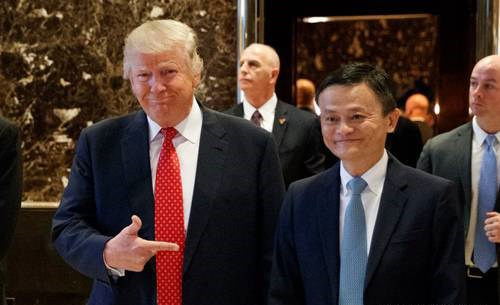By Tom McGregor, CCTV.com Panview columnist & editor
On Monday, the world’s third richest man, Jack Ma, founder of Alibaba Group, met US President-elect Donald Trump at Trump Towers in mid-town Manhattan. The executive chairman of the e-Commerce retail giant, outlined plans to create 1 million new jobs in the US for the next five years.

Ma arrived at a crucial moment to encourage better relations between Trump and China. Fears were rising that Washington is headed for imminent trade wars against Beijing after Trump enters the White House on Jan. 20.
More face-to-face talks between the Chinese and Trump’s transition team can alleviate concerns and avoid misunderstandings. By engaging in more communication channels, both sides can find common ground and agree to win-win solutions.
Nevertheless, some remain skeptical Ma’s 1 million new American jobs strategy will work, but let’s take a closer look at its brilliance.
Big boost for small biz
After meeting Ma, Trump said on Twitter, “$BABA wants to create US jobs by helping US small businesses and farmers sell to China’s 300 million-strong middle class.”
The US faces a huge trade deficit with China, which continues to increase day-by-day. To overcome challenges, US companies have to get more successful in exporting ‘Made in USA’ products to China.
Large US-based corporations, such as Apple, Disney and Nike, have enjoyed success selling in the China market, but what about small and mid-sized enterprises?
Well, smaller companies have had a harder time in China, since Chinese consumers are more likely to purchase ‘Made in China’ goods if they don’t recognize the brand name. That’s a trust issue and pricing factor as well.
Chinese goods are cheaper than imports from the US and Europe.
Luring Chinese middle class
As China’s economy continues to expand, so does the size of its middle class. It might grow up to half a billion people in the next few years.
Chinese middle class consumers are more selective about the products they buy. They prefer safety over less expensive, quality over quantity and brand-name over the unknown.
Ma had written an op-ed in the Wall Street Journal touting his business expansion strategy for the US. He wants to sell more American fresh foods, cosmetics and baby products on Taobao.
“If you ingest something or it touches their skin; they don’t want it made in China,” Alibaba PR director Robert Christie told CNBC. “That’s everything from makeup to vitamins to lotions to clothes. We know there’s demand for that in China.”
Accordingly, farmers and US manufacturers can focus on these consumer sectors to market for Chinese online buyers.
Seizing the Belt & Road
Ma’s meeting with Trump serves as an opening gesture for Beijing to invite the President-elect to China. China’s Belt & Road Initiative (B&R) will have an international conference in Beijing.
“Though this visit (by Ma) was at the outset a business visit, it will no doubt help improve US-China relations,” Wang Yiwei, professor at Remnin University told the Hindu. “We are, in fact looking forward to welcoming Mr. Trump’s participation at the International cooperation summit on the Belt & Road this May.”
The Trump transition team has hinted Washington will enroll as a signatory member of the China led Asian Infrastructure Investment Bank (AIIB).
The Obama administration had refused to sign up, citing transparency concerns. But, Trump, a more pragmatic politician, could see the Belt & Road and AIIB as golden opportunities for US manufacturers to work with China and generate bigger revenues and profits.
Ma the bridge builder
Trump hailed Jack Ma, “a great, great entrepreneur, one of the best in the world,” when talking to reporters after the meeting on Monday. “He loves this country and he loves China.”
This is an amazing signal showing that despite recent tensions between Beijing and Trump, the two sides can still communicate and seek positive measures to boost bilateral relations with the two great nations.
( The opinions expressed here do not necessarily reflect the opinions of Panview or CCTV.com. )

Panview offers a new window of understanding the world as well as China through the views, opinions, and analysis of experts. We also welcome outside submissions, so feel free to send in your own editorials to "globalopinion@vip.cntv.cn" for consideration.















